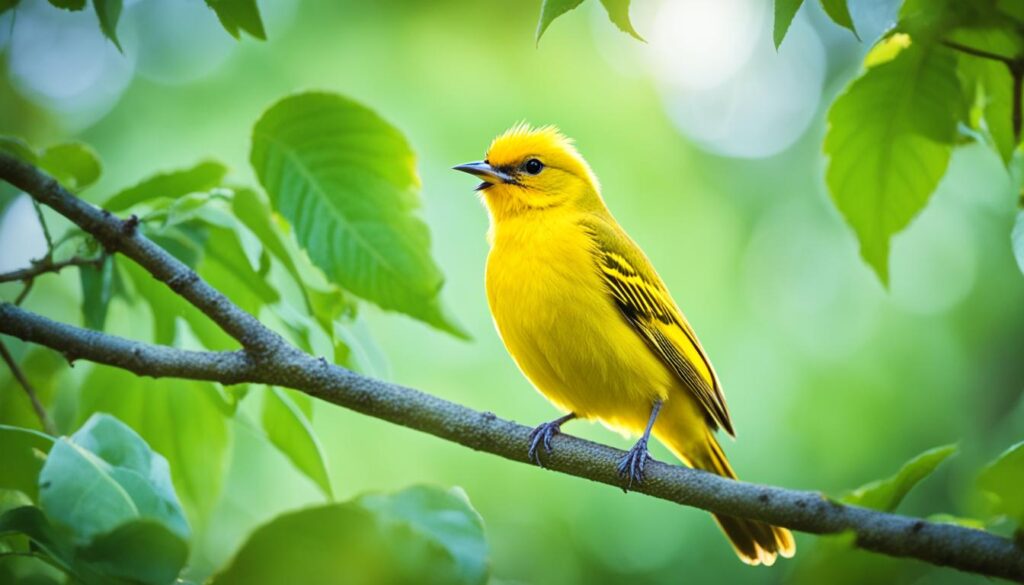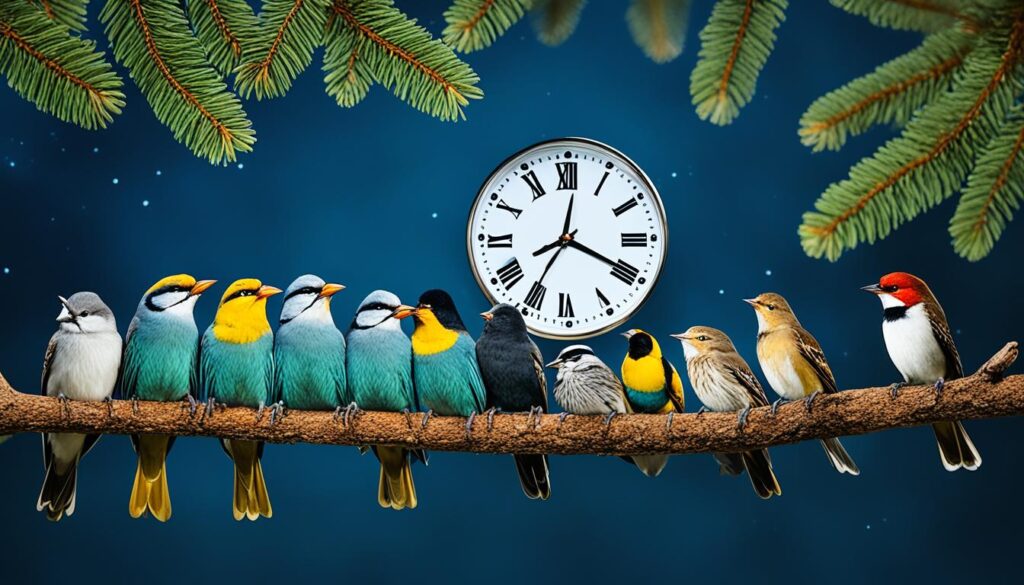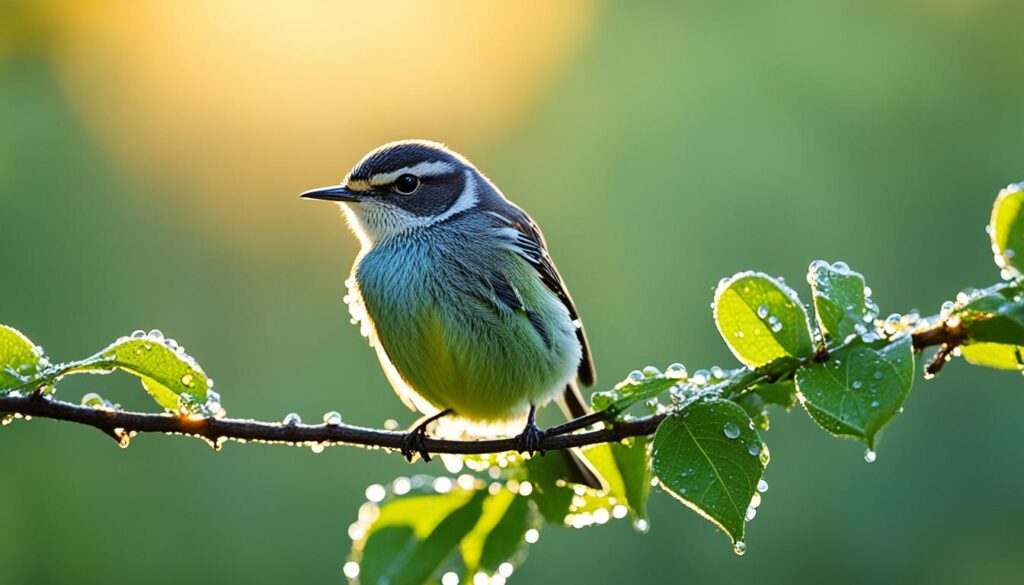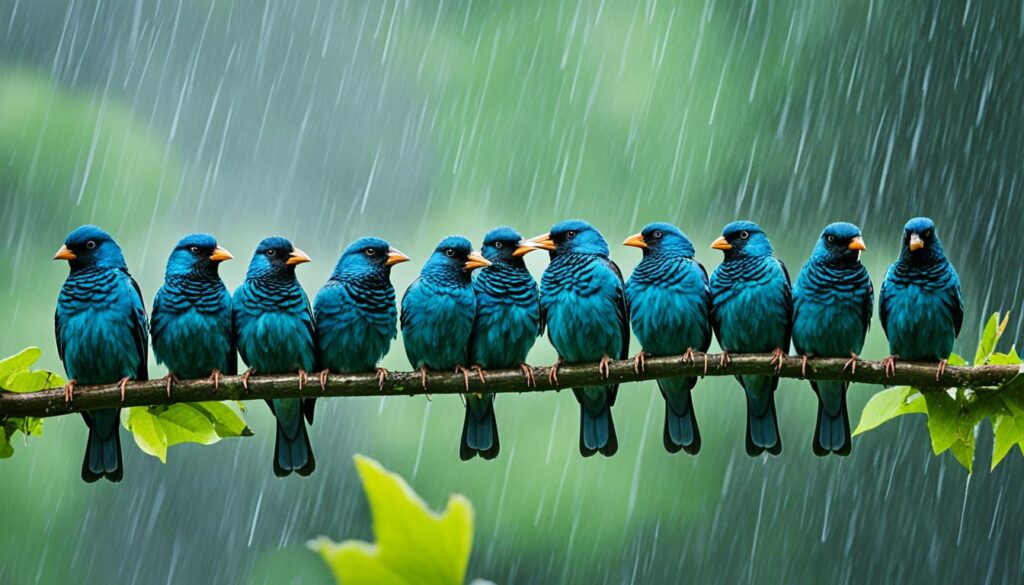As the first rays of sunlight peek over the horizon, a symphony of birdsong fills the air. This is called the dawn chorus. It happens when birds wake up and start their daily routines. Birds, like humans, have a natural rhythm that tells them when to sleep and wake up. Sunrise often wakes them up.
Many birds, especially male songbirds, wake up early. Some start singing before dawn, as early as 3 a.m. They sing for many reasons, like to protect their territory, find a mate, and get their voices ready for the day. The dawn chorus is a beautiful display of nature’s rhythms. It shows how amazing our bird friends are.
Key Takeaways
- Birds have natural circadian rhythms that align with the light-dark cycle of the environment.
- The dawn chorus is a phenomenon where birds, especially male songbirds, sing vigorously before sunrise.
- Birds wake up at dawn, with sunrise acting as their natural alarm clock to start their daily activities.
- The dawn chorus serves multiple purposes, including territorial defense, mate attraction, and vocal warm-up.
- Different bird species exhibit varying wake-up times, with some species like American robins and blackbirds starting their pre-dawn singing as early as 3 a.m.
What is the Dawn Chorus?
As dawn starts, the air fills with a beautiful mix of birdsong. This magical event, called the dawn chorus, happens early in the morning before the sun comes up. It’s a stunning show of birds waking up, signaling a new day.
Collective Birdsong Before Sunrise
The dawn chorus starts about 30 minutes before sunrise. Early birds like American robins and blackbirds lead the song. As the sky gets lighter, more birds join in, making a beautiful mix of sounds that lasts into the morning.
Signals of Breeding Season and Territory Marking
The dawn chorus is linked to the breeding season and birds’ need to mark their territory. Male birds sing a lot during this time to find mates and protect their homes from other birds. The avian morning chorus is key to this, helping birds talk to each other and claim their place in nature.
“The dawn chorus is one of nature’s most enchanting and mysterious phenomena, a symphony of sound that signals the start of a new day.”
Why Do Birds Sing in the Early Morning?
As the sun starts to rise, birds fill the air with beautiful songs. This marks the beginning of the day. But why do birds sing so early? It’s because of their biology, behavior, and the natural world’s rhythms.
Spring Breeding Season
Birds sing early in the morning to find mates during spring. This is crucial for them to set up territories and find partners. By singing loudly, male birds show they’re fit and claim their territory. This tells females they can provide a safe place for their babies.
Warning Off Rival Birds
The early morning songs also help birds defend their territories. By singing loudly, male birds warn off other birds. This is key to keeping their resources, like food and nesting spots, safe for their young.
Warming Up for Better Songs
Birds also sing in the early morning to get their vocal cords ready. As the day goes on, their singing gets better. They start with simple songs and then sing more complex ones as the sun rises. This helps them attract mates and keep rivals away.

The dawn chorus is a beautiful event that shows how birds, their environment, and evolution are connected. By understanding why birds sing early, we appreciate the natural world’s complexity and beauty more.
Factors that Make Birds Wake Up Early
Birds wake up early because they see the light change. This tells them it’s morning. Many things affect when they start their day.
Seasonal Changes
The time of year changes when birds wake up. In warm months, they wake up early, like robins at 3 AM. But in cold months, they may wait longer to wake up to save energy.
Light Pollution
City lights can mess with birds’ sleep patterns. Studies show some birds start singing 30 minutes too early because of this.
Variations Among Species
Not all birds wake up at the same time. Each type has its own way of sleeping and singing. For example, robins start singing first, while chaffinches sing closer to sunrise. This depends on how they find food, breed, and adapt to their surroundings.
Learning about what makes birds wake up early helps us understand their behavior. It shows how complex their world is.
“The dawn chorus is a magical time of day, when the air is still, the world is quiet, and the birds come alive with song.”
What Time Do Birds Sing in the Morning?
If you love birdwatching, you know the morning is best for hearing birds sing. The dawn chorus is a beautiful mix of bird songs. It starts before sunrise and goes on for hours.
Birds start singing early, from March to July, with the most songs in May and June. The chorus is loudest about 30 minutes before sunrise. But, birds keep singing into the morning.
The dawn chorus is amazing, not just a bunch of noise. Male birds sing to attract mates and defend their territory. Their songs help us identify them and show strength to rivals.
“The dawn chorus, the period before sunrise when birds sing, mainly consists of male birds protecting their territory or trying to attract a mate.”
Studies show bird songs can travel far at noon too. But, early morning songs are clearer and more consistent. This makes them better for defending territory and attracting mates.
To hear the magical what time do birds sing in the morning and bird dawn chorus timing, wake up early. Go outside before the sun rises. The bird morning song peak is a treat for nature lovers.

When do birds wake up?
The early morning hours are magical for birds as they wake up to start their day. Most birds wake up at dawn, with the sunrise being their alarm clock. But, the time they wake up can change based on the species, location, season, and weather.
Research shows that different bird species have their own morning routines. For example, robins wake up up to 80 minutes before sunrise. Blackbirds wake up about 70 minutes early. Song sparrows start their day at first light, 30-60 minutes before sunrise. Owls, being nocturnal, are active either before dawn or at night.
Birds wake up earlier in the summer because of longer days. This shows how different birds have their own morning habits. Each species has its own way of adapting to its environment.
“The dawn chorus of birds can start as early as 4:00 a.m. and can last several hours, with the majority of the singers being male birds.”
The dawn chorus is a beautiful sound of birds singing before sunrise. It’s mainly male birds singing to attract mates and claim their territory. Singing in the early morning helps them spread their songs far and show they’re the best.
Scientists have studied why birds sing in the early morning. But, it’s clear the dawn chorus is a key part of their day. It shows how amazing our bird friends are.
What is the First Bird that Sings in the Morning?
As the first light of day peeks over the horizon, birds start singing. But who are the first to greet the dawn? American robins, blackbirds, and thrushes often lead, singing as early as 3 a.m. in some places.
Early Bird Species
Not all birds start singing at the same time. American robins, blackbirds, and thrushes are usually among the first. Wood-pigeons, wrens, and warblers also join in early.
As the sky gets brighter, great tits, blue tits, sparrows, and finches add their songs. Together, they create a beautiful morning song.
Sequence of the Dawn Chorus
- American robins, blackbirds, and thrushes start singing as early as 3 a.m.
- Wood-pigeons, wrens, and warblers sing a bit later.
- Great tits, blue tits, sparrows, and finches join when it’s light enough for them.
The dawn chorus is a magical event that changes with the location. By knowing when and which birds sing, we can enjoy the beauty of nature’s morning songs.

Why the Early Morning Singing?
The dawn chorus fills the air with birds singing in the early hours before sunrise. But why do birds sing so much in the morning? It’s mainly for territorial defense and mate attraction.
Territorial Defense
By singing loudly in the dawn, male birds mark their territory. They warn other birds to stay away. This way, they keep their territory safe and maintain peace in the bird world.
Mate Attraction
The early morning is perfect for male birds to find a mate. Their songs carry far in the quiet air before it gets busy. Singing well shows they are healthy, strong, and can protect a good territory, which is what females look for.
Studies reveal that birds sing more clearly in the early morning. There’s less wind and noise, so their songs go further. This helps them reach more rivals and potential mates.
The act of singing early in the morning is a key strategy. It helps birds defend their territory and attract mates. This ensures their survival and the growth of their species.
Myths and Theories about Early Bird Songs
The dawn chorus, a beautiful mix of birds singing before sunrise, has always fascinated us. People have wondered why birds sing so early. Two main theories try to explain this: the song travel distance theory and the strength and vigor theory.
Song Travel Distance Theory
Many thought early singing lets bird songs travel the farthest. This idea said the quiet hours before dawn were best for sound to spread. But, research now shows that bird songs can travel just as well, or even better, during the day.
Strength and Vigor Theory
Another theory is that singing in the morning shows a male bird’s strength and health. Singing is hard work and only the strongest can do it after a cold night. By singing, male birds show off their fitness to potential mates, hoping to attract them.
“The dawn chorus is a symphony of avian serenades, each bird contributing its unique voice to the grand performance. The underlying reasons for this behavior, however, remain a subject of fascination and ongoing research.”
These theories are interesting, but the real reasons for the dawn chorus might be more complex. They could involve defending territory, attracting mates, and the benefits of waking up early. As we learn more about birds, our understanding of their early morning songs might change.

Understanding Bird Circadian Rhythms
Birds, like humans, have natural sleep-wake cycles. These cycles match the day and night of their environment. The time they wake up can change with the species, location, and season. Light is key for birds, waking them up as the day starts.
The bird’s internal clock is made of many parts, like the pineal gland and retinae. These parts work together to keep the bird’s body in sync with the day. The pineal gland and retinae are especially important for controlling sleep and wake times in many birds.
Some birds, like corvids and psittacines, have brains that work a lot like ours. This shows how complex their internal clocks are. It also shows how their brains and clocks work together.
“The avian circadian system comprises mutually coupled pacemakers in the pineal gland, retinae, and avian homologs of the suprachiasmatic nucleus, synchronized by environmental light cycles.”
Learning about bird circadian rhythms and avian sleep-wake cycles helps us understand their behavior and health. By studying their clocks, we see how birds adapt to different places and times. This shows how amazing they are at living in the world.
Factors Influencing Bird Wake-up Times
Birds wake up for many reasons, like light, season, weather, location, and species. These factors help us understand how birds start their day.
Light Levels
Light tells birds it’s time to wake up. As dawn comes and light gets brighter, birds start their day. Some birds, like robins, wake up 80 minutes before the sun rises.
Season
The season changes when birds wake up. In summer, birds wake up early to enjoy the long days. In winter, they sleep in a bit longer, waking up near sunrise.
Weather
Weather affects when birds wake up too. Temperature and rain can make birds wait to start their day. On cold or rainy mornings, they might sleep in.
Location
Where birds live also changes their wake-up times. Sunrise times vary by location. Birds adjust their schedules to match the local sunrise and sunset.
Species
Each bird species has its own morning routine. Some, like robins and blackbirds, wake up early. Others, like owls and nighthawks, are more active at night.
Learning about what affects bird wake-up times helps us appreciate their daily lives. It shows us the beauty of their routines.

Typical Wake-Up Times for Common Birds
Birds wake up at different times, from very early to just after daylight. Knowing when common birds wake up helps us understand their habits and how they adapt to their environments.
American robins start singing as early as 3 AM, 80 minutes before sunrise. Blackbirds and song sparrows wake up 30-70 minutes before the day starts. But, nocturnal species like owls are active at night and wake up late in the morning or during the night.
Many things affect when birds wake up, like light, season, weather, where they live, and their type. For example, birds wake up earlier in summer to find more insects and less competition for food.
Learning about when birds wake up helps us understand their daily lives and how they survive. By watching and recording these behaviors, scientists and bird lovers can appreciate the amazing world of birds more.
- American robins: Up to 80 minutes before sunrise
- Blackbirds: 30-70 minutes before sunrise
- Song sparrows: 30-60 minutes before sunrise
- Owls: Pre-dawn or during the night
“Birds wake up early to take advantage of the abundance of insects and reduced competition for food available in the early hours.”
Advantages of Early Rising for Birds
Waking up early has big benefits for birds. They get to find lots of food before other birds do. This means they can eat insects and other food sources without much competition.
Early morning is also key for male birds. They use this time to sing and claim their territory. It’s a great way to find a mate too. Plus, the quiet and low light make it safer for them to be active.
Foraging Opportunities
Birds that wake up early get to enjoy a lot of food. They can find the best spots and eat before others do. This gives them a big edge in getting what they need for the day.
Mate Attraction and Territory Establishment
The quiet before dawn is perfect for male birds to sing and mark their territory. This dawn chorus warns other birds to stay away. It also helps them find a mate, as females like the birds that sing the best.
Reduced Predation Risk
Early morning is safer for birds. It’s darker and quieter, so they can move and make noise without being seen by predators. This makes it easier for them to be active without worrying about being eaten.

“The early bird catches the worm” – a popular proverb that highlights the advantages of being an early riser, not just for humans, but for our feathered friends as well.
Nocturnal Birds and the Night Shift
Most birds wake up early, but not all. Nocturnal birds like owls and nighthawks are active at night. They hunt when it’s dark, which is when their prey is most active. They sleep when the sun comes up.
Nocturnal birds have special traits for the night. They often have dull colors to hide in the day. They also have big eyes to see in the dark and sharp hearing and smell.
Owls have special facial discs to help them hear sounds. The potoo looks odd but catches insects with its big eyes and wide mouth. It blends in perfectly where it lives.
“The Corn crake, also known as Crex crex, is a secretive nocturnal bird that creates disturbances at night with its continuous calling during the breeding season.”
Nocturnal birds have their own schedules. You can hear them in the early morning or just after sunset. For example, Barred Owls sing in March, April, and early May. Northern Saw-whet Owls are active in March, April, and early May too.
Learning about nocturnal birds can make birdwatching more interesting. It’s great for those who love the night or just find these birds fascinating.
Conclusion
Watching birds wake up and start their day is both fun and educational. It helps us connect with nature and learn about birds’ amazing abilities. Whether you wake up early or sleep in, listening to the dawn chorus is a great way to start your day.
Birds have unique morning routines, from the early birds starting the chorus to the variety of songs that follow. These routines show how adaptable and different birds are. Learning what makes birds wake up at different times, like light, season, and their own traits, helps us appreciate nature more.
The dawn chorus and birds’ morning activities show us the beauty of nature and how everything is connected. By watching and enjoying these moments, we learn to care for our planet and its creatures. This helps us respect the environments that support birds and the balance of life on Earth.
FAQ
When do birds wake up?
Birds wake up like humans, following their natural sleep and wake cycles. These cycles match the light and dark of their environment. The light signals dawn, waking them up.
What is the Dawn Chorus?
The dawn chorus is when wild birds make lots of noise in the early morning. This happens in spring, when they’re looking for a mate or defending their territory. The chorus starts with early birds like American robins and blackbirds, then more species join in as it gets lighter.
It’s most active about 30 minutes before sunrise and goes on into the morning.
Why Do Birds Sing in the Early Morning?
Birds sing early for two main reasons: to protect their territory and to find a mate. They sing loudly to warn other birds away and to show they’re strong and healthy. This makes them more attractive to females.
It’s also a good time for males to be heard clearly before the day gets busy.
What Factors Make Birds Wake Up Early?
Birds wake up early because of light, season, weather, location, and their species. Light tells them it’s morning. They wake up earlier in summer and later in winter.
Weather and where they live also affect their wake-up time. Different birds have their own times to start the day.
What Time Do Birds Sing in the Morning?
Birds start singing early, from March to July, with the most singing in May and June. The best time for singing is about 30 minutes before sunrise.
But they keep singing into the morning. You need to get up early to hear the first songs or identify the birds.
What is the First Bird that Sings in the Morning?
Different birds start singing at different times, making a beautiful morning song. American robins, blackbirds, and thrushes start singing around 3 am.
Then, wood-pigeons, wrens, and warblers join in. Great tits, blue tits, sparrows, and finches sing when it’s light enough for them to see.
Why the Early Morning Singing?
Birds wake up early for many reasons. The morning is a great time to find food before other birds do. It’s also when they establish their territories and find mates.
The quiet and low light of early morning help them sing and move safely without being seen by predators.
What are the Myths and Theories about Early Bird Songs?
Some think birds sing early to make their voices travel far to find mates. But studies show their songs go just as far at noon as in the early morning.
Another idea is that singing shows a male bird’s strength and health. Only the strongest can sing loudly after a cold night.
When do nocturnal birds wake up?
Not all birds wake up early. Nocturnal birds like owls and nighthawks are active at night. They hunt when it’s dark, which is our evening.
They rest as the sun rises, unlike diurnal birds that wake up in the morning.


безопасная сделка аккаунтов услуги по продаже аккаунтов
маркетплейс аккаунтов маркетплейс аккаунтов
маркетплейс аккаунтов маркетплейс для реселлеров
маркетплейс аккаунтов гарантия при продаже аккаунтов
заработок на аккаунтах маркетплейс аккаунтов соцсетей
маркетплейс аккаунтов купить аккаунт с прокачкой
биржа аккаунтов маркетплейс для реселлеров
Account Sale Verified Accounts for Sale
Accounts marketplace Account Buying Platform
Guaranteed Accounts Ready-Made Accounts for Sale
Buy accounts Account Trading
Account Trading Platform Database of Accounts for Sale
Account Buying Service Account Acquisition
Guaranteed Accounts Accounts for Sale
Website for Selling Accounts Accounts for Sale
Account Purchase Database of Accounts for Sale
Profitable Account Sales Account exchange
Account Exchange Service socialmediaaccountsale.com
database of accounts for sale account buying platform
account selling platform account acquisition
account buying platform secure account sales
ready-made accounts for sale purchase ready-made accounts
accounts marketplace account exchange service
buy and sell accounts account trading platform
account trading buy and sell accounts
marketplace for ready-made accounts find accounts for sale
database of accounts for sale account store
ready-made accounts for sale account marketplace
sell pre-made account account selling platform
account exchange service account buying platform
account acquisition buy accounts
account marketplace buy and sell accounts
verified accounts for sale find accounts for sale
website for selling accounts account sale
secure account purchasing platform website for selling accounts
account sale account selling platform
account exchange buy and sell accounts
account exchange service ready-made accounts for sale
account buying service account trading
account trading service account trading platform
accounts market sell account
account buying platform discount-accounts.org
accounts marketplace sell pre-made account
accounts for sale website for selling accounts
online account store purchase ready-made accounts
guaranteed accounts account market
buy and sell accounts https://accounts-offer.org
account purchase accounts-marketplace.xyz
sell accounts buy-best-accounts.org
account buying platform https://social-accounts-marketplaces.live
account trading service https://accounts-marketplace.live/
secure account purchasing platform https://social-accounts-marketplace.xyz
accounts for sale https://buy-accounts.space
social media account marketplace buy accounts
account selling platform https://social-accounts-marketplace.live/
sell account https://buy-accounts.live
marketplace for ready-made accounts https://accounts-marketplace.online
account store https://accounts-marketplace-best.pro
покупка аккаунтов akkaunty-na-prodazhu.pro
площадка для продажи аккаунтов https://rynok-akkauntov.top/
купить аккаунт https://kupit-akkaunt.xyz
маркетплейс аккаунтов купить аккаунт
магазин аккаунтов https://akkaunty-market.live/
купить аккаунт kupit-akkaunty-market.xyz
биржа аккаунтов магазины аккаунтов
маркетплейс аккаунтов https://online-akkaunty-magazin.xyz
покупка аккаунтов https://akkaunty-dlya-prodazhi.pro/
покупка аккаунтов https://kupit-akkaunt.online
facebook ad accounts for sale buy a facebook ad account
buy facebook ad account https://buy-ad-accounts.click
buy facebook account https://buy-ad-account.top/
facebook ads account for sale https://buy-ads-account.click
buy facebook accounts https://ad-account-buy.top
facebook account buy buy a facebook account
buy old facebook account for ads buying fb accounts
buy facebook profiles https://buy-ad-account.click
buy facebook account buy facebook account
google ads account seller https://buy-ads-account.top
google ads reseller buy google adwords accounts
fb account for sale https://buy-accounts.click
buy google ads verified account https://ads-account-for-sale.top
buy google ads buy account google ads
buy google ad account https://buy-ads-invoice-account.top
buy google agency account https://buy-account-ads.work
buy google ads invoice account https://buy-ads-agency-account.top
buy google ads threshold account https://sell-ads-account.click/